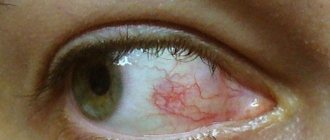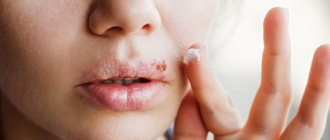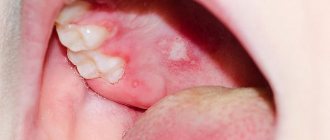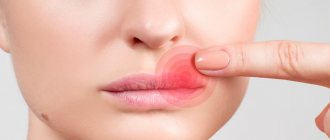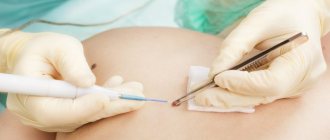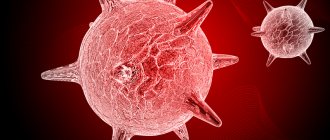Approximately 95% of the world's population is affected by the herpes virus.
If a person has good immune defense, the infection is in a “dormant” state.
If immunity decreases, the virus will immediately make itself known with rashes in the mouth and nose.
Anyone infected with the virus may develop cold sores on their lips and nose.
Some people may not have a rash, but the presence of the herpes virus in the body cannot be ruled out.
Causes of herpes
The causative agent of herpes is the type 1 virus of the same name, which provokes the appearance of a blistering rash on the lips.
You should know that the pathogen is highly contagious.
The virus is present in the body of most people, but not every person develops symptoms.
Those infected with a pathogen, but unaware that they are sick, are carriers of the disease and pose a serious danger to others.
Transmission of the herpes virus can occur:
- as a result of contact with the mucous membrane of an infected person with a rash
- when kissing
- by airborne droplets (during sneezing and coughing)
- when a pathogen enters damaged skin from objects contaminated with viruses
The probability of contracting the virus is 100% even in the absence of close contact.
The disease manifests itself in people with weakened immune defenses, with insufficient intake of vitamins and minerals (iron and zinc) into the body, and suffering from pathologies of the digestive and endocrine systems.
Initially, the pathogen enters the cell, where it begins to actively multiply and infect healthy cells.
As a result, characteristic signs of infection by the herpes virus appear.
Damage to the nasal mucosa occurs with episodes of exacerbation and subsidence of the inflammatory process.
After the first episode of the disease ends, antibodies begin to form.
As immunity decreases, symptoms of infection reappear.
Exacerbations of herpes occur in the following cases:
- as a result of hypothermia
- with exacerbation of existing chronic infections
- as a result of stress and depression
- for colds caused by a viral infection: ARVI, influenza
- for sore throat
- if the body is deficient in vitamins and minerals
- with long-term uncontrolled use of antibacterial drugs and cytostatics
Frequent relapses (more than three times during the year) indicate that a person has reduced immunity.
This condition requires additional examination and specific therapy.
If you leave everything as it is, the infection can lead to damage to various organs and systems.
Treatment and prevention of herpes
The main goal of herpes treatment is to relieve symptoms of the disease and reduce the frequency of relapses. To eliminate the symptoms of oral and genital herpes, ointments and tablets that have a specific antiviral effect are used. The most effective medications for people infected with HSV are antiviral drugs such as acyclovir, famciclovir and valacyclovir. Both tablets and injections, as well as ointments and topical creams are used. To prevent relapses, immunostimulating drugs are prescribed to restore and maintain immunity. They help relieve symptoms and reduce the frequency of their occurrence, but do not lead to a complete cure. It is impossible to completely recover from herpes - the virus remains in the human body for life after the initial infection.
At first glance, it may seem that herpes virus infection is quite harmless. But in fact, it can lead to serious complications:
- In people with weakened immune systems (for example, HIV-infected people), herpes is more severe and often recurs. In rare cases, HSV-1 causes encephalitis (inflammation in the brain), keratitis (inflammation of the cornea of the eye). Herpetic encephalitis leads to death in 30% of cases; after treatment, it leaves serious consequences in the form of persistent paralysis and paresis, and dementia.
- HSV-2 infection increases the risk of human immunodeficiency virus infection.
- In 1 out of 10,000 cases, a child becomes infected during childbirth, and neonatal herpes develops, which leads to severe neurological disorders and death of the newborn. The risks are especially high if the expectant mother becomes infected late in pregnancy.
This is why disease prevention is so important. HSV-1 is most contagious when oral herpes symptoms appear, but it can also be transmitted when no symptoms are felt or observed. Persons with active symptoms of oral herpes should avoid oral contact with other people and sharing household items (dishes, towels, etc.). Patients are also advised to abstain from oral sex to prevent herpes from spreading to the genitals of their sexual partner. People with symptoms of genital herpes should avoid having sex while they have symptoms.
Back to articles
Symptoms of herpes in the nose
Depending on how long you have been infected, certain symptoms will appear.
The consequences of primary infection have more pronounced symptoms.
The symptoms of relapses depend on the state of the immune system.
In some patients, an exacerbation of the process may occur in the form of mild itching and slight redness of the skin and mucous membranes.
Signs of relapse are characterized by:
- hyperemia of the skin and nasal mucosa
- swelling
- presence of tingling and itching in the affected area
- runny nose
If the infection is primary and the immune system is weakened, then the period of exacerbation is accompanied by:
- presence of headache
- temperature rise
- presence of pain in the affected area
- enlarged nearby lymph nodes may be noted
- malaise and weakness
If such symptoms appear, doctors recommend applying antiviral drugs to problem areas.
If this is not done, then in a couple of days herpetic rashes will begin to appear.
During this period, the symptoms of intoxication of the body begin to manifest themselves more acutely.
When a rash occurs, the manifestation of a runny nose intensifies.
The vesicles mature over several days and ulcers remain in their place.
The liquid that flows from the bubbles contains high concentrations of pathogens, and therefore poses a danger to people with whom the patient comes into contact.
Therefore, the affected areas should be treated several times during the day to prevent the spread of infection not only to nearby tissues, but also to others.
Healing of ulcers on the mucous membrane occurs faster than on the skin.
It will take up to three days for the affected tissue to recover.
To exclude the possibility of complications of herpes and the addition of a secondary infection, it is recommended to carry out therapy until the symptoms completely disappear.
If you stop treatment before the relapse ends, then the formation of purulent wounds inside the nose is possible.
2. Reasons
Erysipelas is a bacterial infection, the causative agent of which is almost always group A beta-hemolytic streptococci. This tendency, however, is not absolute: a similar inflammation can be caused by staphylococcus, especially in cases of a long-term chronically recurrent process, as well as other pathogens. In general, we have to take into account the fact that in recent decades in the clinic of infectious diseases, incl. skin, there is a steady tendency towards an increase in combined invasions (for example, bacterial and fungal), developing according to the mechanism of super- or coinfection.
The main risk factor is microtraumatization of the skin of the nose in combination with weakened local immunity and non-compliance with sanitary and hygienic rules.
The risk increases in the presence of foci of chronic coccal infection in adjacent tissues and organs (otitis, tonsillitis, sinusitis, and many others). One of the widespread causes of erysipelas is the practice of self-squeezing out elements of acne and/or pustular (pustular) rash in unsterile or frankly unsanitary conditions. In some cases, nasal erysipelas is iatrogenic in nature, i.e. the launch of the pathological process is caused by medical procedures or surgical intervention on the ENT organs.
Visit our Otolaryngology (ENT) page
Stages of herpes development
| Stages herpes | I | II | III | IV |
| Peculiarities | The appearance of precursors of the disease in the form of hyperemia and itching | Blistering rash formation | Opening of blisters and formation of ulcers | Scab formation and tissue regeneration |
| Duration | From 1 to 2 days | 2-3 days after infection | On the 3rd day | From 4 to 10 days |
If the immune system is able to cope with the virus, then the healing stage proceeds faster than usual.
If the immune system is weakened, complications may develop in the form of the formation of ulcers, and if left untreated, the infection can penetrate the tissues of the organ of vision and brain.
In a child, compared to an adult, the clinical manifestations are more pronounced.
Herpes on the lips
You need to understand that a rash is just a symptom, and you need to fight not with it, but with the virus.
Therefore, you first need to cure the body of the virus, and only then eliminate the external manifestations of the disease. Blisters on the lips need to be dried so that they open and dry. Later, the crust will fall off, and only redness will remain at the site of the rash. The rash on the lips disappears after about a week.
Herpes is a chronic disease and therefore recurs when the immune system is weakened. It is accompanied by fever, headache and poor health.
Lip rash spreads quickly
Herpes can be transmitted by contact. If you have a rash on your lips, you should not kiss, and you should also have separate dishes and a towel. You should not touch your lips with your hands so as not to get it into your eyes and transmit it to other people through touch.
Even the smallest blisters need to be smeared with antiviral ointment three times a day. It is also necessary to take medications orally to act on the virus. The vaccine prevents the virus from recurring. Herpes is also perfectly cured by medications that increase immunity.
What do herpetic rashes in the nose look like?
In the nose, the pathology looks slightly different than when localized on the tip of the nose, on the lips or genitals.
With exacerbation, a rash resembling abscesses appears.
Small, watery blisters filled with transparent contents appear on the nasal mucosa, around which the mucous membrane becomes red.
After some time, the rashes thicken and burst.
In their place, very painful ulcers form.
When the blisters rupture, they release viruses that can spread to the lips and areas around the nose.
Therefore, during this period, it is imperative to use antiviral gels and other drugs prescribed by a doctor for treatment.
How to treat herpes under the nose
To prevent the development of HSV, they strengthen the immune system and prevent the influence of unfavorable factors. They use antiviral drugs in tablets and ointments, and traditional medicine to treat herpes under the nose. The latest methods are used to eliminate pain and itching.
Application of ointments
Ointments are applied to the area of accumulation of bubbles, causing the destruction of the virus under the skin. They burst, dry out, and the epidermis heals. The following groups of creams are used to treat herpes under the nose:
- Antiviral drugs (Acyclovir, Zovirax, Panavir). They act locally, relieve itching and inflammation. The disease is prevented from spreading to other parts of the body. They have virtually no contraindications.
- Antiseptic (“Hexicon”). Used to disinfect the wound surface after the blisters have burst and erosion has formed. The drug is absorbed on the surface of the skin, disinfecting the surface for a long time.
- Antibiotics (Erythromycin, Levomekol). Used for additional disinfection of ulcers. Eliminate inflammation, destroy pathogenic bacteria.
- Anti-inflammatory analgesics (Dimexide). Used for pain, severe burning and itching when the blisters burst.
- Vishnevsky ointment is used to eliminate irritation, itching, and inflammation. Treats ulcers. It is used after eliminating skin wounds and completing antiviral therapy.
- Zinc ointment provides anti-inflammatory, antiseptic, astringent effect. Used after therapy with antiviral drugs.
Acyclovir: choice of form and drug tolerability, consequences
https://youtube.com/watch?v=dW_WhrE5Smc
Preparations for internal use
To treat herpes under the nose, systemic antiviral agents are used, taken in the form of tablets. They have an effect on the entire body. They drink them when rashes occur frequently and the immune system is weakened. The tablets dissolve when they enter the gastrointestinal tract. The active substance is absorbed into the blood and enters infected cells. There it inhibits viral replication. It loses the ability to multiply and spread throughout the body.
Antiherpetic tablets contain the following active ingredients: penciclovir, acyclovir, famciclovir, valacyclovir. They affect the active form of HSV, causing the cessation of DNA synthesis.
Antiviral drugs are classified by area of effect:
- drugs only against HSV ("Acyclovir");
- herpes remedies with an additional immunostimulating effect (“Anaferon”);
- interferon preparations (“Viferon”);
- substances that stimulate the production of your own interferon (Lavomax).
To treat persistent manifestations of herpes under the nose, the latest generation of products are used. They are effective for immunodeficiency. Strong antiviral agents are Foscarnet and Brivudine. The only contraindication is intolerance to the components of the drug.
ethnoscience
To stimulate the immune system, eliminate itching and pain, folk recipes are used. They are used with antiviral medications to treat cold sores under the nose. They are effective in the initial stages of the disease; in advanced forms, they use only traditional methods of treatment.
- Infusions, decoctions. Use brewed celandine and green tea. They are used after infusion. Treat the affected areas of the skin throughout the entire treatment period.
- Oils. They use rosehip, tea tree, fir, and sea buckthorn oil. Treat rashes 3 times a day. They have a disinfecting and softening effect. Relieves itching.
- Eating foods that have an antiviral effect: garlic, onions, legumes, fruits containing vitamin C. You need to eat them constantly, this will prevent the occurrence of frequent diseases.
Diagnosis of herpes
Even if the patient has characteristic signs of infection, additional studies will be required to confirm the diagnosis of HSV.
The statement becomes possible based on:
✔ Cytological examination of biomaterial. For analysis, swabs are taken from the affected areas.
✔ PCR allows you to detect the genetic material of the virus in the test sample (saliva, blood).
✔ ELISA allows you to detect Ig to the herpes simplex virus in the blood, as well as determine the duration of the disease.
Blood tests can identify herpes from other infections with similar symptoms.
Do you have herpes - the main signs of the disease
Since herpes is a viral infection, its appearance in our body has similar symptoms. In these cases, the pattern of virus penetration into the body resembles infection with ARVI or influenza.
If the body is affected, you will be able to note:
- discomfort throughout the body;
- aches and pain in muscles and joints;
- increased temperature (37-40 ° C);
- inflammation of the lymph nodes (pain and increase in size);
However, the most characteristic symptom is considered to be a rash on the lips (lip).
It is important to know! External manifestations of herpes (rashes on the lips) are the final stage of the disease. When the visible sores dry out, the person is no longer contagious and is no longer an open spreader of infection.
Herpes in the nose: features of therapy
Drug treatment of herpetic rashes in the nose involves the prescription of systemic and local drugs.
Depending on the severity of symptoms, treatment can be carried out comprehensively or medications can be prescribed separately.
At the initial stage of development of the pathological process, when only precursors are present, local therapy with Zovirax, Levomekol, and Acyclovir is carried out at home.
Fenistil Pencivir cream can also be used.
The drug Erazaban prevents the development of complications.
Panavir deserves special attention; it helps cope with advanced forms of herpes, relieves pain, has an anti-inflammatory effect, and also helps increase local immunity.
Regardless of the location of the process: at the tip of the nose, in the cavity or near it, the affected areas require treatment.
Timely application of ointments to the affected areas can reduce the spread of infection to the areas surrounding the nose.
They are recommended to be applied in a thin layer to clean skin every 4 hours.
According to doctors, the effectiveness of therapy will be maximum if the affected area is treated in the first two days.
During the treatment process, you should try to touch the rashes with your hands as little as possible and under no circumstances squeeze them out.
Treatment should be carried out very carefully with a disposable cotton swab, after which it must be disposed of.
As soon as a blistering rash appears, the doctor should prescribe complex therapy.
The treatment regimen is supplemented by taking tablets with antiviral effects.
These include Famvir, Valacyclovir, Acyclovir, Valtrex.
Medicines with antiviral effects are not prescribed to be taken orally by children, during pregnancy, or by women during lactation.
Based on the test results, the doctor will determine what types of virus have been identified, calculate the required dosage of the medicine, and also tell you how long to take the pills and what to apply to the resulting ulcers.
Typically, zinc or tetracycline ointment is used to treat ulcers.
Their use will prevent re-infection and spread of infection to nearby areas of the face.
If complications arise and the disease is accompanied by an increase in body temperature and symptoms of intoxication in the patient’s body, then the oral medication regimen is supplemented with Paracetamol or Ibuprofen.
To improve the functioning of the immune system, drugs to strengthen the immune system are prescribed.
In order to accelerate tissue regeneration and prevent the spread of infection, antiseptics are used.
They treat wounds and areas of skin and mucous membranes around the affected areas.
In order to make the body’s recovery process more effective, the following are prescribed:
● Amiksin . The drug helps increase the body's resistance to viruses;
● Polyoxidonium has a stimulating effect on the immune system, which allows the body to effectively cope with infection;
● Neovir . Takes part in the synthesis of interferons aimed at fighting pathogens.
All these measures will be effective and will prevent relapses only if the patient observes the requirements of personal hygiene.
That is, use only personal items when in contact with your face (use only your towel), etc.
As a rule, to assess the effectiveness of drugs, tests must be taken before and after the course of treatment.
Treatment methods for herpes
Treatment of herpes is aimed at suppressing viral activity, as well as increasing immunity. Oral and topical medications may be prescribed.
The selection of drugs is carried out by a doctor depending on the type of disease (type of infection), as well as on the location of the lesion.
It is impossible to completely eliminate the herpes virus from the body. That is why it is important to always maintain the body’s defenses at a sufficiently high level, and also to prevent re-entry of the virus.
Prevention of herpes
If a person close to you has manifestations of herpes (“a cold has popped up on the lip”), try to ensure compliance with the following hygiene rules:
- use an individual towel and personal hygiene products (soap, toothbrush, etc.);
- be careful with cosmetics: do not use lipstick of a sick person;
- If you have genital herpes, avoid sexual intercourse.
Make an appointment Do not self-medicate. Contact our specialists who will correctly diagnose and prescribe treatment.
Rate how useful the material was
thank you for rating
How is herpes treated in children and women during pregnancy?
During pregnancy, a woman's body undergoes hormonal imbalance, resulting in decreased immunity.
Therefore, in this state, their body is susceptible to viral infection.
Most medications - antiviral drugs are no exception - have a toxic effect.
So their use during pregnancy and breastfeeding is extremely undesirable.
In this regard, the most rational option would be to use folk remedies, but only with the permission of the attending physician.
Treatment for herpes infection in children is similar to treatment for adults.
Ointments are used as local therapy, and Viferon and Acyclovir are used for systemic treatment.
Another feature of the treatment of pathology in childhood is the presence of age restrictions.
In most cases, the use of systemic agents is contraindicated for children under 12 years of age.
According to experts, the child’s body must overcome the virus itself so that it can easily withstand exacerbations in the future.
With immunodeficiency, the body will not be able to fight the infection, and the progression of the disease will provoke complications.
Therefore, the prescription of antiviral therapy in this situation will be justified.
Completely free: Apply earwax to cold sores
For many reasons, traditional medicine is very sensitive to various types of secretions from the human body. We may also touch upon the issues of urine therapy in other articles devoted to the analysis of home treatment, but with regard to the treatment of herpes, for some reason the choice of healers fell on the contents of the ear canal.
And there is even some justification for the use of this substance in folk medicine:
- sulfur is rich in natural skin oils;
- it contains amino acids and antibacterial substances;
- it is hypoallergenic, as it is produced by the body itself;
- contains silicon, sulfur and other useful chemical components;
- performs the function of immunity, so it will help defeat the virus.
It should be noted that many fluids secreted by a person are factors of local immune defense, for example, saliva contains the protein lysozyme, which protects the oral cavity from microbes, and nasal mucus contains mucin, which prevents infections from entering the respiratory tract.
The essence of local immune protection carried out by the activity of special glands is that its means are effective where, in fact, they are secreted.
Regarding earwax, it is also worth noting that its main role is still reduced to barrier protection against the penetration of dust particles and microbes into the ear canal. All these contaminants just get stuck in it and get stuck. Therefore, having ventured on such an extravagant method of treating herpes, you must understand that you are applying to the lesion not a pure organic product of natural origin produced by the glands inside the ear, but waste material that is already contaminated and is of no value.
And, as is common among fans of traditional medicine, all “safe” healing methods are practiced on children. This is absolutely not worth doing; most often, a misconception about the possibilities of official medicine is instilled precisely at a tender age, and such sophisticated tricks greatly contribute to this. And many psychological traumas of childhood come from just such therapeutic measures.
Where to go if your child has herpes
If signs of infection with a herpes infection appear, the child’s parents should contact their local pediatrician at the clinic at their place of residence so that the doctor can immediately prescribe treatment.
To prevent recurrence of infection caused by the herpes simplex virus, a specialist may suggest vaccination.
The doctor will also prescribe medications whose action is aimed at increasing immune defense - interferon and immunostimulants.
Causes
Such a cold on the nose cannot be considered a purely cosmetic problem; in addition to affecting appearance, it can cause serious discomfort to a person. The virus will begin to rapidly spread throughout the body, if you do not consult a doctor in time, do this when the first symptoms appear
It is easier to prevent the occurrence of a disease than to cope with it, so it is important to consider the causes of herpes on the nose, here are the main ones:
- neglect of healthy sleep, regular lack of rest, gradually depleting the body;
- poor nutrition, characterized by a lack of macroelements, microelements, vitamins and other useful substances;
- the approach of menstruation in women;
- abuse of bad habits, primarily smoking and alcoholism;
- presence of sedentary work, sedentary lifestyle;
- one-time hypothermia or overheating of the whole body;
- constant stressful situations, discomfort, impaired emotional state and other psychological problems;
- undergoing an extremely serious illness or even surgery;
- taking antibiotics or other potent drugs;
- the presence of herpes infection on other parts of the face, for example, on the lips.
At the beginning of the development of the disease, patients note the appearance of bubbles, and this is possible on any nasal area. The infection spreads quickly, and the patient himself aggravates the situation. After scratching the blisters, the infection remains on the hands and can be carried to another part of the body.
If your herpes symptoms don't go away
To understand why the symptoms of the virus remain, you will need to undergo a series of tests so that a specialist can assess the state of the immune system.
What kind of doctor cares for such patients?
The role of immunity, in this case, is of paramount importance, and in its absence, consultation with an immunologist is necessary.
The doctor will conduct the necessary examination and determine the reason for the lack of effectiveness of the therapy.
After this, the immune system will be corrected.
Recipes for preparing folk remedies for herpes
Doctors, when answering the question of how you can treat herpes at home using traditional medicine, note that most of them are based on substances that are always available in the house.
The choice of folk remedies used also depends on the location of the inflammation.
Recipes for folk remedies for getting rid of herpes on the lips:
- Mix 2 teaspoons of honey, 1 teaspoon of ground coffee, half a teaspoon of flour and 2 cloves of chopped garlic.
- To prepare the composition, mix 1 teaspoon of honey with 1 teaspoon of ash and 3 cloves of chopped garlic.
- Squeeze 1 tablespoon of juice from calendula leaves and mix it with 1 tablespoon of Vaseline.
All ingredients are finely ground to a paste and applied liberally to the problem area. You should do from 5 to 7 procedures.
We treat herpes on the lips using traditional medicine
- To prepare the medicinal composition, you need to mix 1 spoon of celandine juice and 1 spoon of honey. Lotions with the composition are applied to the affected area until the manifestations completely disappear.
- In a large cup, brew tea with viburnum berries. It should be taken orally until the symptoms of the virus are completely eliminated.
- A compress with oak bark helps answer the question of how to remove herpes and dry out existing sores. To do this, it should be mixed with chamomile in a 1:1 ratio. Instead of chamomile, you can also use calendula tincture mixed with oak in the same proportions.
When answering the question of how herpes can be cured, doctors recommend that all people adhere to the following simple rules:
- maintain personal hygiene and eat right;
- do not kiss strangers;
- purchase for yourself separate dishes, cutlery and personal accessories: towel, soap, slippers;
- avoid visiting public baths, saunas and steam rooms;
- Use cotton swabs when applying the cream.

